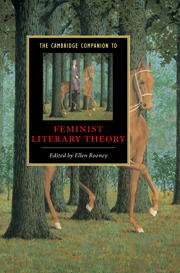Book contents
- Frontmatter
- Introduction
- Part 1 Problematics emerge
- Part 2 In feminism’s wake: genre, period, form
- Part 3 Feminist theories in play
- 9 Poststructuralism: theory as critical self-consciousness
- 10 Feminists theorize colonial/postcolonial
- 11 On common ground?: feminist theory and critical race studies
- 12 Feminist psychoanalytic literary criticism
- 13 Queer politics, queer theory, and the future Of “identity”: spiralling out of culture
- Index
10 - Feminists theorize colonial/postcolonial
from Part 3 - Feminist theories in play
Published online by Cambridge University Press: 28 November 2006
- Frontmatter
- Introduction
- Part 1 Problematics emerge
- Part 2 In feminism’s wake: genre, period, form
- Part 3 Feminist theories in play
- 9 Poststructuralism: theory as critical self-consciousness
- 10 Feminists theorize colonial/postcolonial
- 11 On common ground?: feminist theory and critical race studies
- 12 Feminist psychoanalytic literary criticism
- 13 Queer politics, queer theory, and the future Of “identity”: spiralling out of culture
- Index
Summary
Postcolonial feminist theory's project can be described as one of interrupting the discourses of postcolonial theory and of liberal Western feminism, while simultaneously refusing the singular “Third World Woman” as the object of study. From the early 1980s onward, postcolonial feminism in the West has been centrally concerned with the terms in which knowledge about non-Western women was produced, circulated, and utilized. In postcolonial literary analyses, issues of location, of representation, of “voicing” female subjecthood, and of the expansion of the literary canon emerged as important foci. As a critical approach, the postcolonial literary feminism that would radically alter the study of literature in the Western academy can be traced to a few key critical essays written in the early 1980s. In this essay I discuss a range of the most significant contributions to postcolonial literary feminism and situate them in relation to the work of numerous scholars in the fields of colonial and postcolonial studies and feminist literary scholarship. I will present Gayatri Chakravorty Spivak, a feminist and cultural theorist, born and educated in India and based in the United States as an exemplary critical figure; a discussion of the trajectory of her work will allow us to consider some of the major ideas in the field. Postcolonial feminist literary critics negotiate with a wide range of related discourses in order to revise the terms in which the location of the critic and of the literary subject are understood. Indeed, postcolonial feminist criticism contests the very location of literature itself.
- Type
- Chapter
- Information
- The Cambridge Companion to Feminist Literary Theory , pp. 211 - 231Publisher: Cambridge University PressPrint publication year: 2006
- 4
- Cited by

